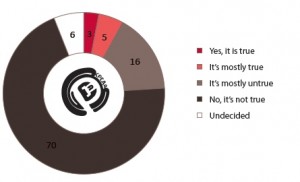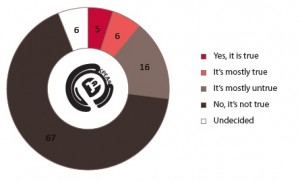Unfriendly attitude in Orthodox churches
09/01/2011The results of the All-Russian representative survey conducted by the service SREDA (field work: Public Opinion Foundation “PENTA”, sample 1500 people)
86% of Russians have never come across with unfriendly behavior in Orthodox churches: unfriendliness on the part of the clergy was reported by 8%, while 6% found it difficult to answer. Unfriendliness from old ladies in churches was reported by 11%.
Women are more likely than men to suffer from negative attitudes of priests. They’re twice as likely as men to complain about the negative attitude of the ‘babushkas’ (elderly ladies) (women 14% vs. men 7%).
It is interesting to note that active churchgoers are faced with unfriendly attitude towards themselves more often than those who visit churches only once in a while. Unfriendliness from the clergy was reported by 12% of the Orthodox Russians participating in parish life, and by 5% of the Orthodox who do not participate in parish life.
The least percentage of reports about unfriendly attitude in churches came from the wealthiest of the respondents.
Please tell me if you find the following true or false: “I’ve encountered an unfriendly attitude on the part of elderly women in Orthodox churches.”
Most respondents did not encounter an unfriendly attitude from priests or elderly women in Orthodox churches. In all, 8% voiced complaints in this sense against the priests, and 11% against elderly women.
Women are more likely than men to say that they have encountered a negative attitude from priests. But men are more likely than on average to have no answer to this question. Unfriendly elderly ladies are twice as likely to bother women (14%) than men (7%).
Among those who complain about the unfriendliness of clergymen and elderly women, there is a higher percentage with higher education and residents of major cities (apart from Moscow).
Interestingly, a higher percentage of the poorest citizens say that they have faced an unfriendly attitude of priests and “babushkas”. And the most affluent – least often.
Respondents’ age does not have a correlation on the responses: the representatives of different age groups respond alike with only one exception: citizens over 65 years least often speak about being faced with unfriendly priests. And those between 45 to 50 years more often than on average struggle with giving a specific answer to both questions.
While people with higher education often complain of unfriendliness on the part of priests (10%) and elderly parishioners (14%), respondents with only lower school education, on the contrary, rarely complain about such attitudes. That is, 4% of them speak about unfriendly priests, 8% – about unfriendly elderly women.
Least likely to suffer from unfriendliness of priests and “babushkas” are the working class. On the contrary, professionals more often speak of negative attitudes of priests. Entrepreneurs are more likely to complain about elderly women.
The least likely to complain about negative attitude of priests and elderly women are residents of small towns, non-believers and respondents who consider themselves ill.
Respondents from rural areas most often were unable to give any specific response.
In terms of the federal districts: malevolence of priests and parishioners is more often referred to by respondents in the South and North Caucasus federal districts. Least often – in Volga, Siberian and Far Eastern federal districts.
If we look only at respondents who identified themselves as Christians: the non-Orthodox Christians are more often faced with unfriendly attitudes from priests than the Orthodox. As for the Orthodox Christians of the Russian Orthodox Church: they are less likely to encounter negative attitudes of priests (the non-church goers are more likely), yet more likely to encounter negativity from elderly women. Particularly affected by negative attitudes are those who describe themselves as a “churchgoers, as much as I can.” It is interesting that those who are not interested in participating in parish life rarely complain about an unfriendliness of priests and elderly women compared to more parish-active Christians (or those who would like to participate more).





